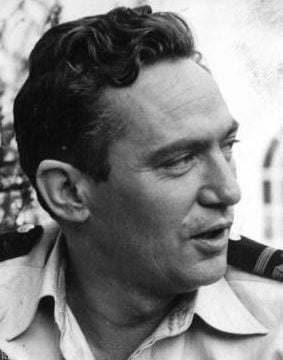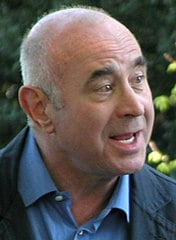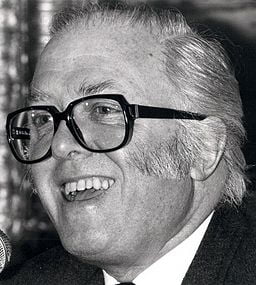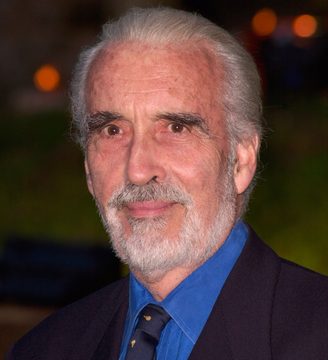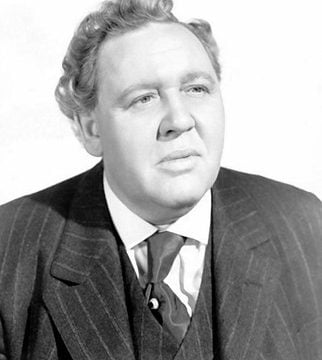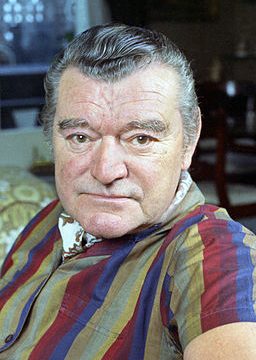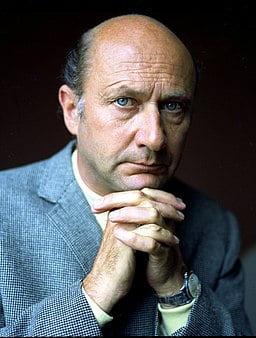
Early life
Donald (Henry) Pleasence was born on 5 October 1919 in Worksop, Nottinghamshire. He was the son of Alice and Thomas Stanley Pleasence, a railway station master. His brother, Ralph, five years older, was his only sibling. Pleasence was brought up as a strict Methodist in the small village of Grimoldby, Lincolnshire. He received his tertiary educated at Crosby Junior School in Scunthorpe and Ecclesfield Grammar School in Sheffield.
After leaving school and failing to get into RADA, he worked as a clerk at Swinton railway station. Determined to succeed as an actor, he wrote scores of letters to find work in the theatre. It paid off, as he eventually got a placement with a Jersey theatre company. Pleasence made his theatrical debut there in a production of “Wuthering Heights” on the eve of WW2.
The 1940s
At the start of WW2, Pleasence refused conscription into the Armed Forces and registered as a conscientious objector. However, he changed his views on the war after London was bombed by the Luftwaffe in 1940. He signed up to join the RAF and served with Bomber Command as a wireless operator. On 31 August 1944, after flying on numerous raids he was shot down over France. He was captured and imprisoned in a German POW camp for the rest of the war.
After the war ended, Pleasence returned to Britain and was discharged from the RAF in 1946. He resumed his stage career the same year in a London production of “The Brothers Karamazov”, with Alec Guinness. He followed that up with a stint on Broadway working for Laurence Olivier’s touring company.
Film Career
In 1952, Pleasence, already a small screen regular, appeared in his first movie as an extra in the TV horror film Dybbuk. His big-screen debut came two years later with a credited part in the British comedy-drama The Beachcomber (1954). By 1960, he had already appeared in some 25 films of almost every genre. Some of his notable early film appearances were in 1984 (1956), Barnacle Bill (1957), The Wind Cannot Read (1958), and Look Back in Anger (1959), which starred Richard Burton. It was also in 1960 that he won major critical acclaim on the London stage for his performance as the beguiling tramp in The Caretaker. The accolade was repeated for his Broadway appearance in the same role the following year.
Balded-headed and slightly built, Pleasance was hardly ideal leading man material. Rather, his piercing blue eyes and exceptional impassioned voice became his working tools. Thus, he was often cast as an evil, insane or fanatical character. Such parts include a rare lead role in Dr Crippen (1962), as a crazy prophet in the epic spoof Hallelujah Trail (1965), and as a double agent in the science-fiction film Fantastic Voyage (1966).
Stardom
Contrary to Pleasence’s image as a baddy, one of his best-remembered roles is that of RAF Flight Lieutenant Colin Blythe in The Great Escape (1963). His performance as the mild-mannered Blythe, a forger who is losing his eyesight, stood out, in an all-star cast that included; Steve McQueen, James Garner, Richard Attenborough, Charles Bronson, and James Coburn. Nevertheless, few would argue that Pleasence’s most iconic screen portrayal was that of the James Bond villain Ernst Blofeld in You Only Live Twice (1967).
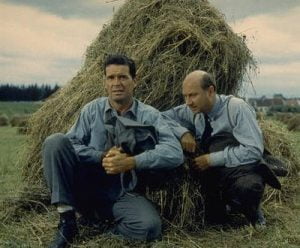
Donald Pleasence with James Garner in The Great Escape (1963). Photo credit: Flickr/(CC BY-NC-SA 2.0)
The celebrated success of his “Bond” role meant that the dye was cast as far as his on-screen career was concerned. Throughout the 1970s, he was inevitably cast as a villain. In 1972, he also pulled the plug on his highly successful stage career to concentrate his efforts on motion pictures and television. Never known to turn down the chance of a payday, Pleasence went on to star in a number of low-budget horror movies. These included the likes of Death Line (1972), From Beyond the Grave (1973), The Mutations (1974), I Don’t Want To Be Born! (1975), and The Uncanny (1977). However, he still managed to secure some decent Hollywood roles in films such as The Black Windmill (1974), Hearts of the West (1975), and The Last Tycoon (1976).
Further Success and Decline
In 1978, Pleasence was asked by the young director John Carpenter to star in his new (low-budget) horror film Halloween. He reputedly only took the role of Dr Samuel Loomis because one of his daughters told him how much she had enjoyed Carpenter’s previous film Assault on Precinct 13 (1976). The film was a surprise smash hit with both audiences and critics. It also became the most successful independent movie of its time, grossing over $60 million. Pleasence went on to resurrect the role a further four times in Halloween’s five sequels to date. He teamed up with Carpenter again for more success in the role of the kidnapped US President in Escape From New York (1981). Throughout the rest of the ’80s, Pleasence continued to star in mainly low-budget films.
In the 1990s, Pleasence began to slow down and reigned in on his prolific work schedule. However, he still made nine more films before his death in 1995. He also continued to add to his large catalogue of TV work, right up to the very end. His last TV appearance was in the mini-series Signs and Wonders in 1995. His last three films, Halloween: The Curse of Michael Myers (1995), Safe Haven (1995), and Fatal Frames (1996), were all released posthumously. In all, Pleasance appeared in some 140 films, with his final screen outing coming in Halloween Kills (2021) when he appeared in archive footage.
Personal life
Pleasence married four times and had five children, all daughters. In 1941, he married Miriam Raymond, which produced Angela and Jean. The couple went on to divorce in 1958. Pleasence then married Josephine Martin Crombie the following year. The couple had two children, Lucy and Polly, but divorced in 1970. Pleasence got married for a third time to Meira Shore, in the same year. The couple produced a daughter, Miranda, but they also divorced in 1988. His last marriage to Linda Kentwood was also in 1988. It lasted up until Pleasence’s death in 1995.
Pleasence was famously nonchalant about the acting profession. His quotes include; “I am not one of those actors who believes he has to live the part he is playing. I can turn it on and off”. And, “I don’t use any set methods, not even The Method. The character after all is in the lines.”
Achievements outside acting include authoring the successful children’s book Scouse the Mouse, published in 1977. He was also awarded an Order of the British Empire (OBE) by Queen Elizabeth II for services to acting in 1994.
Death
Donald Pleasence died suddenly at home, aged 75, on 2 February 1995, in Saint-Paul-de-Vence, France. The cause of death was due to heart failure, following complications from heart surgery. Though he had undergone the operation two months earlier, his death was deemed as being unexpected. His body was cremated at a local cemetery near his French home.
Header image credit: Wikimedia Commons (CC BY-SA 3.0)
